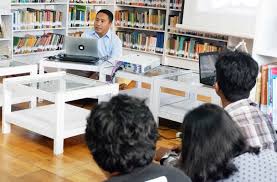
The discussion on the 411 and 212 rallies in Indonesia never ends. Both the pros and cons continue to emerge. By sticking to their arguments and understandings, they continue to multiply mass and followers. In SEA-Talks # 16 organized by Center for Southeast Asian Social Studies (CESASS) UGM on (30/08), action 212 was discussed by Dr.Abdul Gaffar Karim, lecturer of Political and Governmental Department, Faculty of Social and Political Sciences UGM in a discussion entitled ” Radicalism and Unattended Communities “.
As a researcher, Dr. Abdul Gaffar participated in a rally on 21 February 2017 to witness the object of his research with his own eyes. Dr. Abdul Gaffar as the speaker really lit a fire of spirit on SEA-Talks # 16 and made the audience stunned to listen to his story while observing the 212 action in the House of Representatives (DPR) Senayan, Central Jakarta.
Dr. Abdul Gaffar told how the action took place in an orderly manner. The funds that flowed on the rallies are abundant, as evidenced by the abundance of food distributed for free. Not only food, the accommodation and transport for groups who came from outside Jakarta were also fully funded until the groups did not need to spend a dime. Where the abundant funds came from was unknown. The organizers got it when they previously opened a donation for this action via social media.
Beginning with the story of Dr. Abdul Gaffar’s experience in Central Jakarta, SEA-Talks # 16 was followed by the formulation of the problem in the matter of who were the perpetrators of the 212 rally, especially those from Yogyakarta. The answer is detailed and interesting. Instead of members of community organizations, those people were what they call ‘unattended communities’, those from the lower and middle class who did not have access to basic services such as education and health, and did not get social support.
These were the people who turned out to join in small groups who secretly spread radicalism. The reason was clear, because by joining the group, the people belonging to the unattended communities got what they did not get before. Their lives were supported by the group, even their debts were repaid. No wonder, they would do anything to earn a decent living, even if it was to join in a radical group.
Indeed, radicalism is the seed of terrorism. However, Dr. Abdul Gaffar stressed that they are different; radicalists are not necessarily terrorists. Thus, one way to tackle radical acts that lead to terror is to improve the system from the central and regional governments so that basic services can be accessed by all societies so that the unattended communities are reduced and the spread of radicalism is not widespread. (Nitya)
